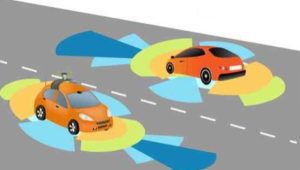
Study Pours Cold Water on AI Driving Algorithms

A recent report emerging from the center of U.S. auto manufacturing rains on the AI parade with research results claiming autonomous vehicle algorithms fare poorly in bad weather.
The study by researchers at Michigan State University found that even light rain or drizzle can interfere with algorithms used in self-driving car cameras. That could mean future fleets might initially be restricted to sunny states like Arizona, California and Florida.
The Michigan State study determined that the core problem stems not from cameras used as primary sensors for detecting obstacles but the algorithms used to sort through computer vision data.
“When we run these algorithms, we see very noticeable, tangible degradation in detection,” Hayder Radha, a Michigan State University professor of electrical and computer engineering, told Automotive Newsin late November.
“Even low-intensity rain can really create some serious problems, and as you increase the intensity, the performance of what we consider state-of-the-art mechanisms can almost become paralyzed,” added Rahda, who oversaw the study.
The university researchers found that computer vision algorithms failed to detect about 20 percent of objects in light rain. The failure rate doubled when rain intensity was tripled.
Additional factors such as seasonal changes like reduced autumn foliage and colder weather also affected other autonomous vehicle sensors like radar and lidar. Changing seasonal scenes underscored a need to update high-resolution maps used by autonomous systems.
“I’d say now that challenging weather conditions are going to be a problem for many years to come,” Radha told the automotive web site.
Weather concerns have not dampened investor enthusiasm in autonomous systems startups. For example, Korean car maker Hyundai (OTCMKTS: HYMTF) announced in November it is investing in Allegro.ai, an Israeli startup applying deep learning to computer vision for car navigation. Founded in 2016, Allegro.ai emerged from stealth mode in April upon completion of a Series A funding round that raised $11 million.
Hyundai Cradle, the auto manufacturer’s venture arm, entered into a strategic partnership with Tel Aviv-based Allegro.ai. It did not disclose the amount of its investment, saying only that the collaboration would help accelerate deployment of the startup’s AI technology.
Among them is autonomous driving, which Hyundai and a growing list of automotive startups are pursuing with varying degrees of success. Hyundai said it expects to deploy Allegro.ai’s computer vision technology for auto applications like navigation and real-time decision-making.
Others are taking interim steps in their efforts to deploy self-driving vehicles in controlled environments. For example, Boston-based Optimus Ride is using early investor Nvidia’s (NASDAQ: NVDA) Drive AGX Xavier computing platform as part of a planned driverless fleet service in “geofenced” areas such as planned communities, campuses and other designated autonomous-driving zones.
Recent items:
AI Partners Shift Driverless Cars into High Gear
Investors Accelerating Driverless Car Development



























